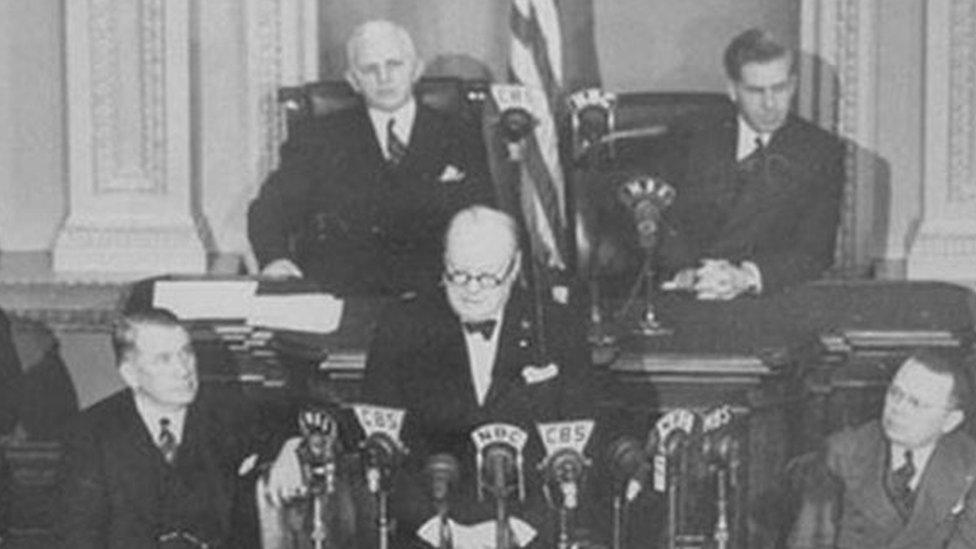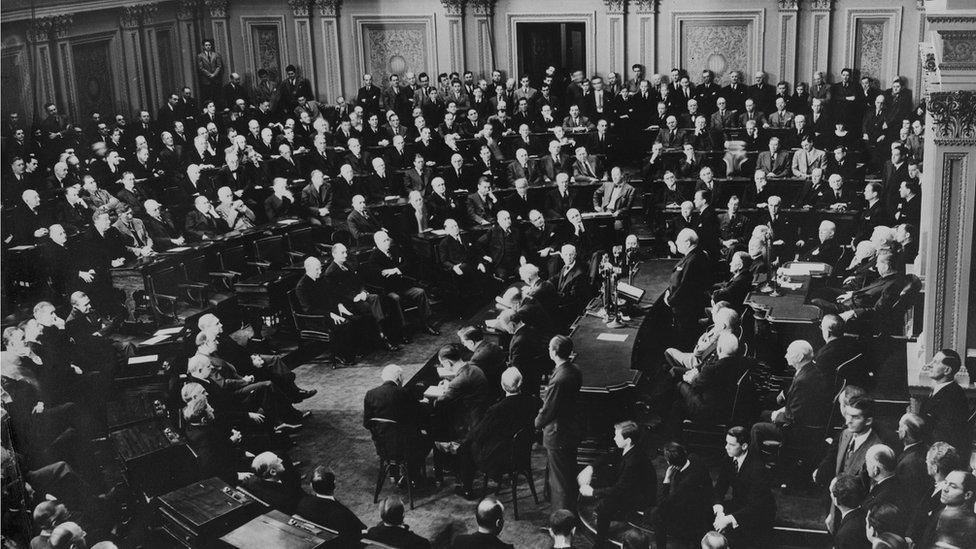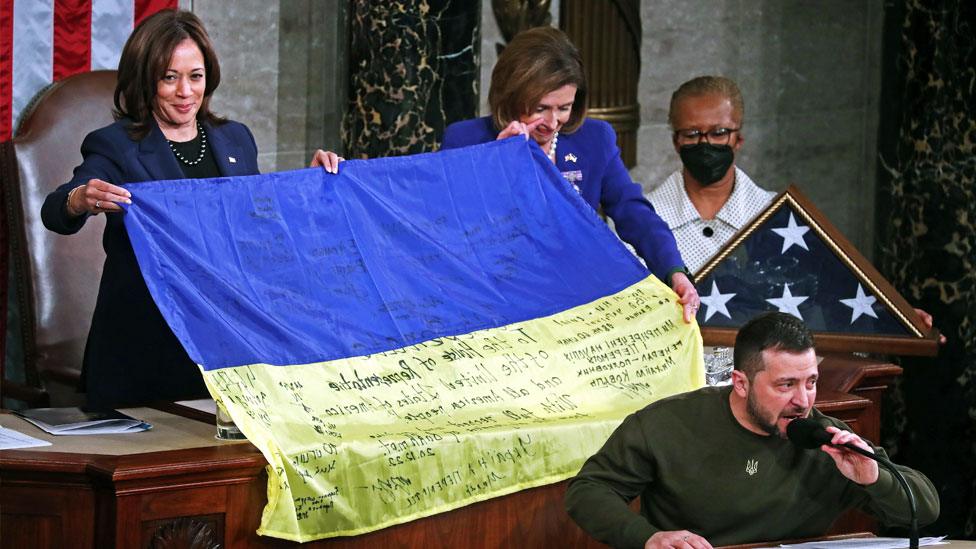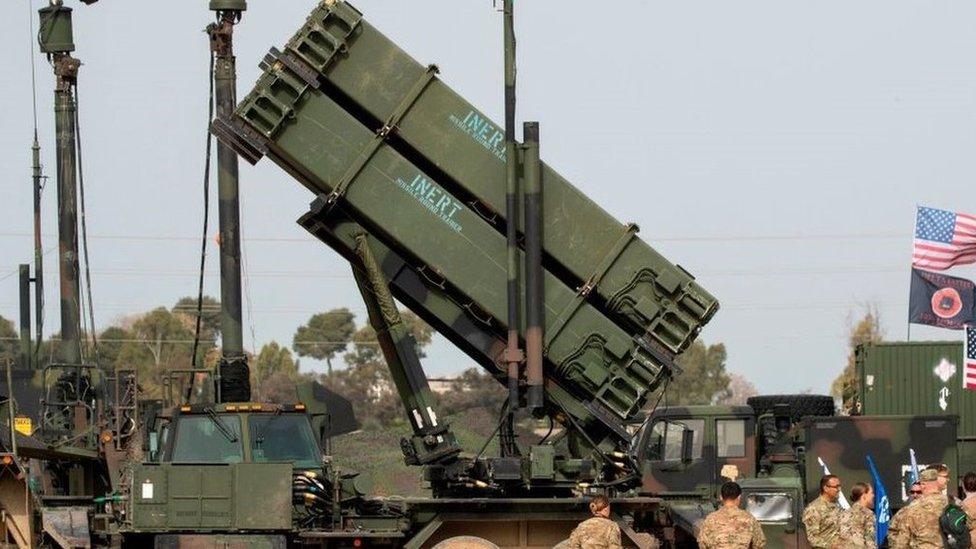Zelensky's address to US Congress comes 81 years after Churchill did the same
- Published

Winston Churchill addresses the US Congress on 26 December 1941.
It was 26 December 1941, when Winston Churchill stood before the US Congress and delivered a 30-minute speech that would go down in history as one of the most important visits to Washington by a foreign leader.
Eighty-one years later, nearly to the day, Congress welcomed another high-profile wartime leader who had made a dangerous journey across the Atlantic to appeal directly to America's politicians for help.
There are major differences between World War Two and the current conflict in Ukraine, but House Speaker Nancy Pelosi, who invited Ukrainian President Volodymyr Zelensky, was keen to draw parallels between the visits.
"Another historic leader addresses the Congress in a time of war," she noted before his address, "with Democracy itself on the line."
Churchill takes Washington by storm
World War Two had already elevated Mr Churchill to a global household name, synonymous with Britain's determined efforts to fend off Nazi Germany.
When he arrived in Washington in December 1941, the conflict had just arrived on America's doorstep. Less than three weeks prior, Japan had attacked Pearl Harbor, and President Franklin D. Roosevelt had declared war on the country, marking the US's belated entry into WW2.
His presence in Washington caused a flurry of excitement. He held a press conference with Mr Roosevelt and even participated in the lighting of the national Christmas tree. "Americans have caught on to one of Winston Churchill's major characteristics - his ability to thrill a crowd," The Washington Post reported.
But the marquee event was his 26 December 1941 speech to Congress, which took place in a US Senate chamber overflowing with lawmakers, cabinet officials, and dignitaries (Mrs Pelosi's father, Representative Thomas D'Alesandro Jr, was serving in Congress at the time).
Watch: The British Prime Minister delivered a stirring speech about WW2.
After a hearty welcome, Mr Churchill took the dais, whipped out his spectacles, and began one of the most important speeches of his career. The prime minister offered words of flattery and friendship to the United States, invoking the strong relationship and cultural similarities between the two global powers. But he soon moved on to more sombre subjects.
"You do not, I am certain, underrate the severity of the ordeal to which you and we have still to be subjected," Mr. Churchill said. "The forces ranged against us are enormous. They are bitter, they are ruthless."
He proceeded to paint a harsh picture of the Axis powers.
"The wicked men and their factions, who have launched their peoples on the path of war and conquest, know that they will be called to terrible account if they cannot beat down by force of arms the peoples they have assailed. They will stop at nothing," Mr. Churchill said. "They have a vast accumulation of war weapons of all kinds. They have highly trained and disciplined armies, navies and air services. They have plans and designs which have long been contrived and matured. They will stop at nothing that violence or treachery can suggest."
While he warned a "time of tribulation was upon us," he sought to project optimism that the Allies, now with the help of the United States, could turn their fortunes around in the coming three years.
Of their Axis enemies, Mr Churchill declared that "they do not realise that we shall never cease to persevere against them until they have been taught a lesson which they and the world will never forget." He had to pause his speech, due to raucous applause.

The speech came soon after the US entered World War Two following Japan's attack on Pearl Harbor.
"Here we are together," Churchill said, "Defending all that to free men is dear."
The prime minister's speech received rapturous coverage the next day. "CONGRESS THRILLED," declared the New York Times, which described "wild bursts of enthusiasm and chuckles of mirth" from the audience.
WATCH: President Zelensky's US visit in 90 seconds
Zelensky's different Washington mission
Eight decades later, Mr Zelensky's visit to Washington generated a similar flurry of coverage and anticipation. In echoes of Mr Churchill's own itinerary, he first met with President Joe Biden before making his way across town to the US Capitol.
When he addressed Congress later, he did not mention Winston Churchill directly, but ended his speech by drawing a comparison with World War Two.
"Standing here today, I recall the wars of the president Franklin Delano Roosevelt, which are I think so good for this moment. The American people, in their righteous might, will win through to absolute victory."
Like Mr Churchill, Mr Zelensky's relentless public presence throughout Ukraine's war with Russia has made him a hero to those supporting his country's cause.
But he was appealing to a Congress far more divided than perhaps the one Mr Churchill encountered, with growing opposition from some Republicans to the United States' significant military and financial support to Ukraine.
Related topics
- Published22 December 2022

- Published21 December 2022

- Published22 December 2022